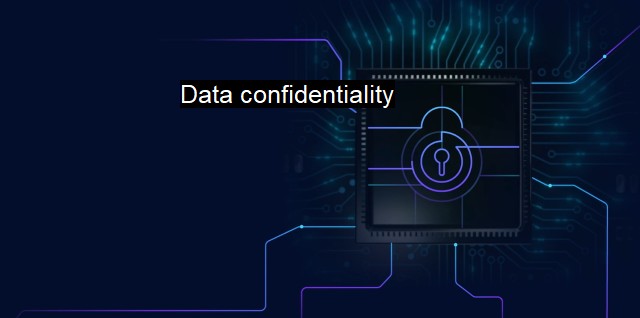What is Data confidentiality?
The Importance of Data Confidentiality in Cybersecurity: Best Practices for Protecting Personal and Sensitive Information Using Antivirus Software
Data confidentiality is a critical aspect of information security that involves protecting information from unauthorized access or modifications. Another way to conceptualize data confidentiality is regarding the privacy of data. In the broad field of cybersecurity and antivirus, maintaining the confidentiality of data is paramount to the integrity of systems and the privacy of users.At its core, data confidentiality is concerned with ensuring that only authorized individuals or systems can access specific information. It prevents unauthorized disclosure of data or information through hacking, data interception, or using exploits to gain unauthorized access to systems. Data confidentiality covers not just the electronic data stored in computers or transmitted over networks, but it also includes physical data such as printed documents or conversations held in a discreet manner.
Various protocols and strategies are implemented to maintain data confidentiality. The use of strong encryption is one of the most common methods. Encryption transmutes data into a format that can only be read through a decryption process, and that typically requires a decryption key. Anyone trying to snoop on the data would find gibberish unless they also possessed the key. This makes encryption particularly effective for maintaining the confidentiality of data against interceptive attacks often favored by cybercriminals.
Antivirus software also contributes to data confidentiality but operates differently from encryption. It helps by shielding computers from malware such as trojans, worms, viruses, and other malicious codes that criminals use to gain illegal access to systems or to corrupt or steal data. By detecting and removing threats, antivirus software can help prevent breaches of data confidentiality.
Authentication also plays a crucial role in data confidentiality. By reliably verifying user identity through mechanisms such as passwords, biometrics, and multi-factor authentication, unauthorized access to sensitive data can be prevented. Higher-risk systems might also use session timeouts to minimize the opportunities for unauthorized users to gain access to systems left temporarily unattended.
Nonetheless, while well-thought-out policies and technical solutions can significantly enhance data security, human behavior continues to be a central factor in data breaches. Careless handling of data and devices, sharing passwords, unknowingly downloading malicious software, and falling prey to phishing scams expose systems to confidentiality breaches. Hence it's vital that creating a culture of security awareness and educating employees about safe computing practices be part of any comprehensive data confidentiality strategy.
Concerns for data confidentiality are only growing as digital transformation continues to permeate all aspects of human life, be it personal or professional. In a world increasingly connected via the internet, maintaining data confidentiality has become a colossal but crucial challenge.
Preserving data confidentiality is not just about keeping information private. It goes to the heart of trust in digital systems. Where a breach of confidentiality occurs, it can damage individual privacy, corporate competitiveness, and even national security. This can result in severe financial and reputational damages.
To wrap up, data confidentiality implies protecting information from unauthorized access, ensuring that only those intended to can access the data. With evolving threats around every digital corner, maintaining data confidentiality has never been more critical. It remains fundamental to the broader field of cybersecurity, revolving around the usage of encryption, antivirus software, authentication while underlining the need for public education with regard to safe computing practices. By sturdily defending data confidentiality, we not only safeguard private information but also uphold trust in digital systems and interfaces that are increasingly central to work, life, and play.

Data confidentiality FAQs
What is data confidentiality?
Data confidentiality refers to the protection of sensitive information from unauthorized access, use, or disclosure. In cybersecurity and antivirus, data confidentiality ensures that data remains secure and private, preventing information breaches that could harm individuals or organizations.Why is data confidentiality important in cybersecurity?
Data confidentiality is essential in cybersecurity because it helps protect sensitive information from theft, tampering, or unauthorized use. Hackers who gain access to confidential data can use it for malicious purposes, such as identity theft, financial fraud, or corporate espionage. Protecting data confidentiality is critical in preventing these types of cyber attacks.What are some measures used to ensure data confidentiality?
There are several measures used to ensure data confidentiality in cybersecurity and antivirus, including encryption, firewalls, access controls, and user authentication. Encryption involves converting information into a secret code that can only be deciphered by authorized users. Firewalls are software that prevent unauthorized access to a network, while access controls limit who can access certain data. User authentication ensures that only authorized individuals can access sensitive data.What should I do if I suspect a data confidentiality breach?
If you suspect a data confidentiality breach, you should report it to your organization's IT department or cybersecurity team immediately. They will be able to investigate the situation and take appropriate measures to prevent further damage. You may also need to report the breach to regulatory authorities, such as the Information Commissioner's Office (ICO) in the UK, if the breach involved personal data.| | A | | | B | | | C | | | D | | | E | | | F | | | G | | | H | | | I | | | J | | | K | | | L | | | M | |
| | N | | | O | | | P | | | Q | | | R | | | S | | | T | | | U | | | V | | | W | | | X | | | Y | | | Z | |
| | 1 | | | 2 | | | 3 | | | 4 | | | 7 | | | 8 | | |||||||